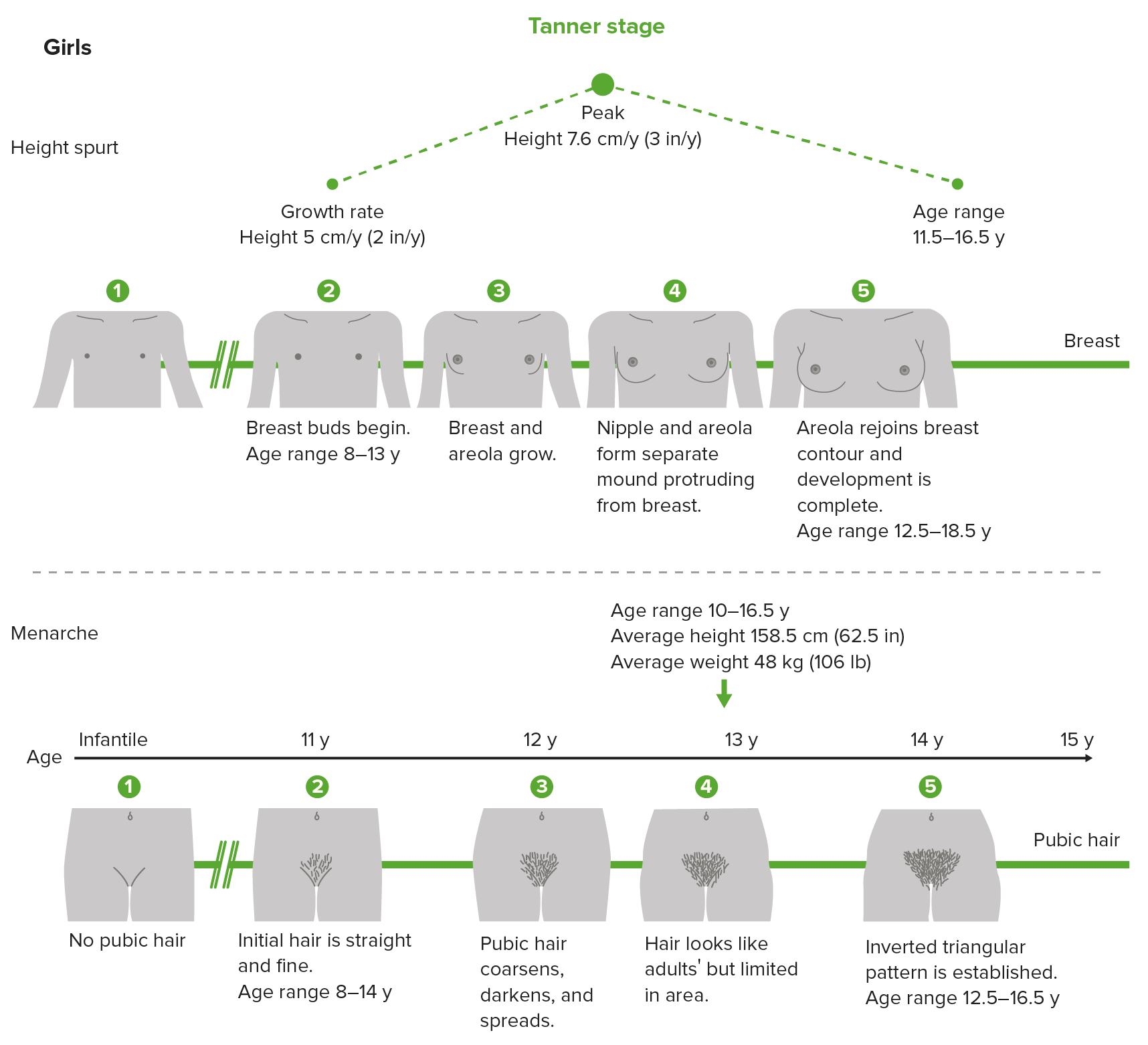Playlist
Show Playlist
Hide Playlist
Delayed Puberty in Children
-
Slides Puberty Pediatrics.pdf
-
Download Lecture Overview
00:01 So causes of delayed puberty in boys are multiple, but generally if they are central they are more likely to be a cancer. 00:14 In boys, we're gonna suspect this if there is no testicular enlargement after 14 years of age. 00:22 In girls, we're gonna suspect delayed puberty if there's no thelarche by the age of 13. 00:28 So boys are allowed the next 3-year delay. 00:31 They start later, they finish later. 00:34 Keep in mind though that 2.5% of healthy boys and girls do have delayed puberty We're using this cut-off so that we can check kids as early as we can without having to test too many children. 00:47 So what are the types of delayed puberty? Well, we have constitutional delay. 00:53 This is by far the most common. 00:55 These are simply children who are having their puberty later. 00:59 Much like they might have a later growth spurt. 01:02 This is common if there is a family history of delay, if the parents don't have a delay on their pubertal development, or also in children who have excessive exercise or work very hard at the sports. Sometimes this will happen. 01:15 There may be a problem with the gonadotropin. 01:18 The gonadotropins are FSH and LH. 01:21 This would be hypogonadotrophic hypogonadism. 01:25 In other words, their gonads are less productive because of a hypogonadotrophic state. 01:30 This is a problem with the brain or they might have primary gonadal failure which is hypergonadotrophic hypogonadism. 01:38 This is because they have lots of gonadotrophs and very little response. 01:43 So let's drill down on causes of hypogonadism. 01:48 When the gonadotropins are the problem, there are some central issues that we might see. 01:56 One classic example is Kallmann syndrome. 01:59 This is an isolated deficiency in the pituitary and also these patients often have anosmia. 02:07 So, they are not smelling very well because of the problem with the first cranial nerve and they will have isolated deficiency of production of their gonadotropins. 02:16 This can be functional as well, patients with eating disorder, excessive exercise, some of our real-star athletes, will have a delay in their puberty and that's a central process. 02:28 Remember the 'athlete triad' in girls: the female athlete triad is a combination of three conditions: disordered eating, amenorrhea, and osteoporosis. 02:39 Like we stated in boys, often it is a pituitary lesion so we need to worry about pituitary lesions in these children. 02:47 And certainly, we would worry about it in a child who has a history of pituitary surgery. 02:52 Remember, resection of pituitary adenomas carries with it about a 15% chance of being having problems with pituitary endocrine function afterwards. 03:04 Flip side, if there's primary gonadal failure we have to think about some other potential causes of what's going on. 03:12 There are some genetic causes such as Klinefelter's, which is XXY or Turners syndrome which is just one X. 03:20 And in both those genetic situations, children have a decreased responsiveness of their gonads to the gonadotropin that's trying to get them stimulated. 03:31 Also, patients may have a history of a radiation of the testis, or chemotherapy, or rarely children can have autoimmune ovary disease which will result in a hypogonad state where there is hypergonadotropic levels of hormone, FSH and LH, which are trying to stimulate a diseased ovary. 03:52 So if we have delayed puberty in a healthy child, we're going to check LH, FSH, estradiol in girls, and testosterone in boys. 04:03 If the child has a concern, it's gonna be largely guided by our exam. 04:08 What is the problem? Consider thyroid hormone levels, prolactin levels, and CBC, and sed rate as a way of measuring chronic malingering condition. 04:19 Delayed puberty, if there's constitutional delay we're gonna manage it simply by reassurance. 04:27 Eventually your child is gonna have their period, don't you worry about a thing. 04:31 For boys, we typically treat this with testosterone injections. 04:36 Typically, this happen about once a month. It's not too troublesome. 04:41 Families don't usually have a problem with it but it is expensive and so you probably will have to document testosterone deficiency prior to the insurance company being willing to pay for the therapy. 04:51 For girls with delay, you can consider initiation of estrogen therapy. 04:57 Usually, we simply put them on an estrogen pill like an oral contraceptive pill and that will start to promote the puberty and get them regular. 05:05 So that's all I have today about delayed puberty and how we deal with that problem. 05:11 Thanks for your attention.
About the Lecture
The lecture Delayed Puberty in Children by Brian Alverson, MD is from the course Pediatric Endocrinology.
Included Quiz Questions
A girl presents with delayed puberty. You notice she has a short stature and a broad neck and wide-spaced chest. What is the most likely diagnosis?
- Turners syndrome
- Kallman syndrome
- DiGeroge syndrome
- Kleinfelter’s syndrome
- Downs syndrome
Which of the following is the age limit for the diagnosis of delayed puberty in both boys and girls?
- 14 years for boys and 13 years for girls
- 13 years for boys and 14 years for girls
- 14 years for both boys and girls
- 15 years for boys 16 years for girls
- 16 years for both boys and girls
Which of the following set of lab works is required for a patient with delayed puberty who is otherwise healthy?
- LH, FSH, estradiol in girls and testosterone in boys
- CBC with ESR
- TSH
- Prolactin
- Growth hormone
Customer reviews
5,0 of 5 stars
| 5 Stars |
|
1 |
| 4 Stars |
|
0 |
| 3 Stars |
|
0 |
| 2 Stars |
|
0 |
| 1 Star |
|
0 |
Excellent lecture. Usually, endocrinology is not so well-taught. That is not the case here.




